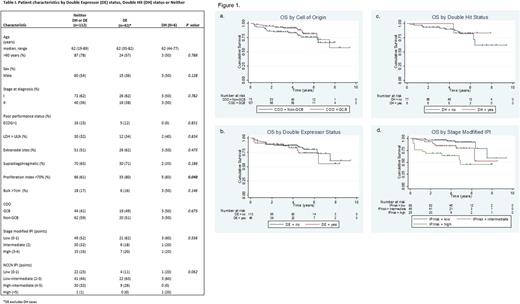Abstract

Background:
In diffuse large B-cell lymphoma (DLBCL), the presence of an activated B-cell (ABC) or non-germinal center (GBC) phenotype, co-expression of MYC and BCL2 by immunohistochemistry (IHC), as well as the co-occurrence of MYC and BCL2 or BCL6 rearrangements predict for clinically aggressive behaviour. Dose intensified chemotherapy regimens and novel targeted agents have been evaluated in an attempt to overcome this poor prognosis.
Approximately 30-40% of patients present with stage I/II disease when positron emission tomography with computed tomography (PET-CT) is used for staging. Due to the paucity of published data it is unclear whether these prognostic variables hold true in the limited stage group and as such whether justification can be given to altering standard chemoimmunotherapy in a potentially favourable prognostic subgroup.
Methods:
We performed a retrospective review of clinical, radiology, pathology and pharmacy databases at Sir Charles Gairdner Hospital, Hollywood Private Hospital, British Columbia Cancer Agency, Aalborg University Hospital and Nottingham University Hospital in Australia, Canada, Denmark and England, respectively, to identify patients with PET-CT defined stage I/II DLBCL treated with R-CHOP ± radiotherapy. Eligible patients had a histological diagnosis of de novo DLBCL and a minimum of 2 years follow-up.
CD10, BCL6, and MUM1 IHC were used to assign cell of origin (COO) using the Hans algorithm. MYC (positive≥40%) and BCL2 expression (positive ≥50%) were used to define double expressor (DE) status. Molecular rearrangements of MYC, BCL2 and BCL6 by fluorescent in situ hybridisation (FISH) were used to define double hit (DH) cases as those bearing rearrangements in MYC and either BCL2 and/or BCL6. We attempted to retrieve original diagnostic material on all cases to complete the missing IHC and FISH testing.
The primary endpoint of the study was to determine the impact of COO, DE and DH status on progression free survival (PFS) and overall survival (OS) in limited stage DLBCL. Secondary endpoints included the evaluation of prognostic variables and treatment modalities on PFS and OS. Associations between prognostic factors and outcomes were analysed with log-rank tests and Cox proportional hazards models.
Results:
A total of 201 patients with stage I/II DLBCL were included, and their characteristics are summarised in Table 1. The median follow-up for surviving patients in the entire cohort was 4.2 years with 4 year PFS 85% (95% CI 78-89%) and OS 87% (95% CI 82-91%).
182 cases (91%) had sufficient IHC data to determine COO: 107 (59%) GCB, and 75 (41%) non-GCB. There was no statistically significant difference in 4-year PFS (90% vs 79%, P=0.22) or 4-year OS (GCB 93% vs non-GCB 83%, P=0.25) between GCB and non-GCB cases, respectively (Fig 1A). 159 cases (79%) had adequate IHC to assess for DE status and 46 (29%) were identified as DE. There was no statistically significant difference in 4-year PFS (81% vs 83%, P=0.58) or 4-year OS (91% vs 96%, P=0.70) between DE and non-DE cases, respectively (Fig 1B). 83 cases (41%) had adequate FISH results to assign DH status which was present in 6 (7%) cases. There was no statistically significant difference in 4 year PFS (85% vs 89%, P=0.62) or 4-year OS (83% vs 90%, P=0.70) between DH and non-DH cases, respectively (Fig 1C).
Multivariate Cox proportional hazards model adjusting for baseline prognostic factors (Age >60 years, increased serum LDH, bulk, stage II) did not show that COO (OS: HR 0.70, CI 0.06-7.77, P=0.77, PFS: HR 1.16, CI 0.19-7.02, P=0.87), DE status (OS: HR 0.64, CI: 0.06-6.87, P=0.72, PFS: HR 0.64, CI 0.12-3.57, P=0.61) or DH status (OS: HR 0.23, CI:0.02-2.96, P=0.261, PFS: HR 1.00, CI 0.16-6.49, P=0.99) had an effect on PFS or OS in limited stage DLBCL. Patients with low, intermediate and high risk stage modified international prognostic index (SM-IPI) had 4-year OS of 94%, 84% and 64% (P=<0.001, Fig 1D).
Conclusion:
In patients with PET-CT-defined stage I/II DLBCL treated with R-CHOP ± radiation, COO, DE and DH status did not adversely affect PFS or OS. The SM-IPI continues to have prognostic relevance in R-CHOP treated patients. Escalated induction therapy (e.g. dose adjusted EPOCH-R) may not be necessary in patients with stage I/II DH lymphoma. Updated results for the IHC and FISH analyses will be presented at the meeting.
Barraclough: BMS: Other: Travel expenses ASH 2016; Amgen: Other: Travel expenses EHA 2017. Bishton: Roche: Other: Travel expenses ASH. Van Vliet: Takeda: Other: Conference travel funding. Sehn: Janssen: Consultancy, Honoraria; Abbvie: Consultancy, Honoraria; Celgene: Consultancy, Honoraria; Seattle Genetics: Consultancy, Honoraria; Amgen: Consultancy, Honoraria; Roche/Genentech: Consultancy, Honoraria. Augustson: Amgen: Other: Travel expenses to IMW 2017; Janssen: Membership on an entity's Board of Directors or advisory committees. Connors: Cephalon: Research Funding; Bayer Healthcare: Research Funding; Merck: Research Funding; NanoString Technologies, Amgen, Bayer, BMS, Cephalon, Roche, Genentech, Janssen, Lilly, Merck, Seattle Genetics, Takeda,: Research Funding; Janssen: Research Funding; Amgen: Research Funding; F Hoffmann-La Roche: Research Funding; NanoString Technologies: Research Funding; Takeda: Research Funding; Bristol-Myers Squibb: Research Funding; Lilly: Research Funding; Genentech: Research Funding; Seattle Genetics: Research Funding. Scott: Janssen: Consultancy, Honoraria; Celgene: Consultancy, Honoraria; BCCA: Patents & Royalties: Patent describing molecular subtyping of DLBCL licensed to NanoString Technologies. Patent describing measurement of the proliferation signature in MCL.. Savage: Roche: Research Funding. El-Galaly: Takeda: Other: Travel funding; Roche: Other: Travel funding. Villa: Lundbeck: Consultancy, Honoraria; Celgene: Consultancy, Honoraria; Abbvie: Honoraria; Roche: Consultancy, Honoraria; Seattle Genetics: Consultancy, Honoraria; Janssen: Consultancy, Honoraria. Cheah: Abbvie: Research Funding; Roche: Research Funding, Speakers Bureau; Amgen: Other: Conference travel expenses; BMS: Membership on an entity's Board of Directors or advisory committees, Other: Conference travel expenses; Takeda: Speakers Bureau; Celgene: Research Funding; Janssen: Membership on an entity's Board of Directors or advisory committees, Speakers Bureau; Gilead: Membership on an entity's Board of Directors or advisory committees, Speakers Bureau.
Author notes
Asterisk with author names denotes non-ASH members.

This icon denotes a clinically relevant abstract


This feature is available to Subscribers Only
Sign In or Create an Account Close Modal